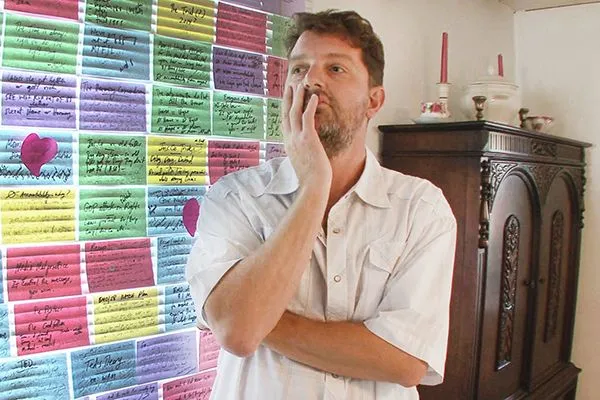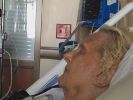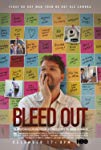Eye For Film >> Movies >> Bleed Out (2018) Film Review
Bleed Out
Reviewed by: Jennie Kermode

Imagine that your mum goes in for a hip operation. She's 71 but in pretty good health. She takes a blood thinning drug which is normally supposed to be stopped for a few weeks before surgery so you think perhaps it would be better to wait, but the surgeon - a family friend - assures you everything will be fine. He operates. Her hip is repaired but she loses almost half the blood in her body, her blood pressure falling to scarily low levels. Afterwards she's placed in an intensive care unit. Or is she? It turns out that, although it's called that, there is no doctor on the ward, just a group of doctors at a nearby airport who occasionally glance at cameras to check their patients. Her camera may not even be turned on. So nobody notices when she slips into a coma, suffering irreversible brain damage.
From then on, almost every interaction with medical or care services just seems to make things worse.

Steve Burrows was a professional comedian. You may have seen him in films like Spy Hard or Chump Change. He hasn't been seen much in recent years because, since this happened to his mother, he's been preoccupied full time with her care, fighting a legal battle for justice and making this film, partly in order to preserve evidence of what she's been through. Alongside the story of her experiences, which appear to involve repeated errors and neglect almost to the point of absurdity, he provides statistical information about medical negligence, the third leading cause of death in the US (for comparison, research by Johns Hopkins estimates it kills 250,000 people there every year, or 0.076% of the population; in the UK, it kills an estimated 0.009%). He invites us to imagine that many people dying in plane crashes and nobody doing anything about it.
Brain damage isn't a naturally entertaining subject, as Steve's agents point out to him part way through, telling him that he needs to start being funny again if he wants to recover his career. It takes a while but even without career-focused effort, black humour eventually emerges as it always does when people are pushed to the edge. After all, much of what he's told, much of what service providers think they can get away with is essentially ridiculous. It's balanced by the confusion of a previously sharp, capable woman who now struggles to maintain any kind of independence and, because of the brain damage, can't understand what has happened to her. In the face of this tragedy, Steve presents us with clips of old home movies and memories of her earlier life, letting us see her as more than a victim.
This is a film that's likely to feel very different to viewers in different places. Frankly, if I were in the US, it would terrify me. The idea that somebody can suffer like that and then be charged money for that and then be bankrupted accessing essential care is shocking; it's not that such problems don't exist elsewhere but that they are really not of the same magnitude. Living with such things, however, can make them feel normal, irresolvable. And as this case illustrates, there's a great deal getting in the way of resolving such problems at an individual level. Nobody wants to see lawsuits brought against doctors. Doctors are heroes, as popular TV shows makes clear. And they have powerful companies behind them and a significant weight of legislation on their side.
Although this documentary is good at backing up its statements and the personal angle place them bin a human context, it has its limitations. We are left to imagine what's going on behind the scenes on the other side, with only scraps of contradictory evidence and recorded phone calls on which to base our theories. There's also a rather odd situation with a relative of Steve's who appears to change sides. Was his position accurately represented in the first place? Has he been leant on by somebody? Steve cannot, in his already straitened circumstances, be expected to resolve all this, but it does leave loose ends which some viewers may find frustrating.
Despite these difficulties, this is a compelling story and a rallying cry for action. It's also a touching tribute to the relationship between mother and son, the stronger because it doesn't back away from difficult issues and try to preserve the mother's 'dignity' at the cost of her voice.
Reviewed on: 11 Dec 2018

















